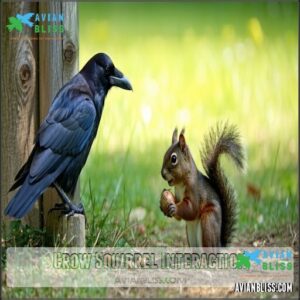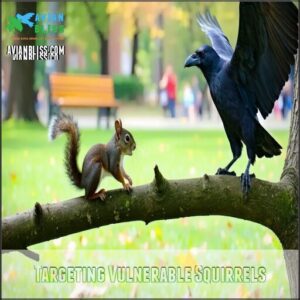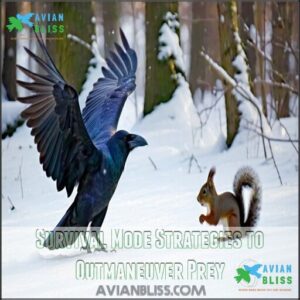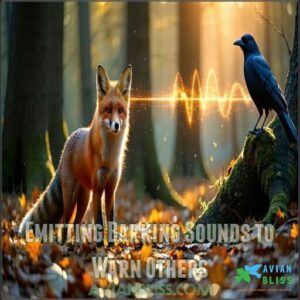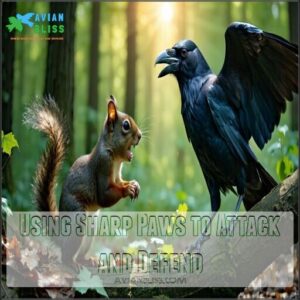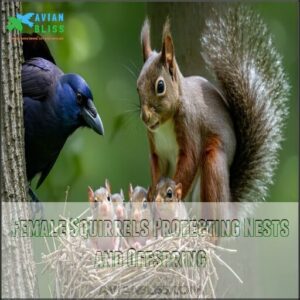This site is supported by our readers. We may earn a commission, at no cost to you, if you purchase through links.

These clever birds are opportunistic feeders, meaning they adapt to what’s available. They’re more likely to scavenge already-dead squirrels or go after weak, young, or injured ones rather than actually hunting healthy adults.
Crows are omnivores, so their diet also includes seeds, insects, fruits, and even garbage.
While crows aren’t exactly squirrel predators, the two species do share a competitive relationship, often squabbling over food sources or territory.
So, do crows eat squirrels? Yes, but it’s more survival instinct than a planned hunting spree. The bigger picture might surprise you.
Table Of Contents
Key Takeaways
- Crows eat squirrels occasionally, mainly targeting weak, young, or injured ones rather than healthy adults.
- These birds are opportunistic feeders and prefer scavenging dead squirrels over hunting.
- Squirrels use alarm calls, sharp claws, and defensive strategies to protect themselves against crows.
- Despite occasional conflicts, crows and squirrels often coexist, adapting to share habitats and resources.
Crow Squirrel Interaction
You’ll find that crows and squirrels share a fascinating relationship, shaped by competition, predation, and resourcefulness.
These interactions reveal how both species adapt to survive, often coexisting while occasionally clashing over food and territory, demonstrating their resourcefulness.
Complex Dynamics Between Species
Crows and squirrels share a fascinating relationship shaped by interspecies communication and behavioral adaptations.
While resource competition is rare due to differing diets, predator-prey dynamics occasionally emerge as crows prey on vulnerable squirrels.
These interactions highlight evolutionary pressures that drive ecological impact.
Observing how squirrels and crows use intelligence and agility showcases nature’s intricate balance of survival and coexistence.
Both species benefit from shared alarm calls, creating a safer environment.
Competition and Predation
Resource scarcity often sparks interesting dynamics between squirrels and crows.
Nest raiding and territorial disputes come into play, especially during breeding seasons, as crows recognize prey vulnerability.
In this evolutionary arms race, squirrels defend fiercely, while crows prey opportunistically.
Though crows eat small mammals occasionally, their predation leans toward scavenging or hunting young, weak targets rather than actively pursuing healthy adult squirrels.
Coexistence and Adaptation
Though competition shapes their relationship, squirrels and crows also show impressive adaptability for coexistence.
Urban adaptation drives resource partitioning and behavioral adjustments.
Here’s how they manage:
- Habitat sharing: Both thrive in forests, backyards, and cities.
- Mutual avoidance: Each avoids conflict unless food’s scarce.
- Crow diet diversity: Focused on eggs, insects, nuts—not mostly squirrels.
- Evolutionary pressures: Promote balanced wildlife interactions.
Do Crows Eat Squirrels
Regarding whether crows eat squirrels, the answer isn’t black and white.
Crows occasionally prey on small or weak squirrels, especially when food is scarce or opportunities arise. These birds, as opportunistic feeders, might hunt baby squirrels if they’re vulnerable or unprotected.
Crows opportunistically hunt unprotected baby squirrels, relying on their sharp instincts and adaptability to secure easy meals.
Crow predation often ties into territorial protection, as they may see squirrels as threats near their nests. However, more commonly, crows scavenge squirrel carcasses left by other predators or roadkill, finding an easy meal.
This scavenging behavior helps maintain ecosystem balance by reducing waste. Crows are also omnivorous eating birds, consuming a wide variety of foods.
While crows are predators in some cases, their role in squirrel predation is relatively minor compared to squirrels’ other predators, such as snakes or domestic cats. They coexist peacefully otherwise.
Crow Hunting Strategies
You might be surprised to learn how crows use clever tactics to hunt small animals like squirrels.
By targeting vulnerable prey and relying on their intelligence, they adapt their approach to improve their chances of success.
Targeting Vulnerable Squirrels
Young squirrels are easy targets in their natural habitats.
Crows eat squirrels when they’re most vulnerable, especially babies or juveniles.
Their strategies often include:
- Spotting squirrel vulnerability like illness or injury.
- Focusing on juvenile predation near nests.
- Using territorial defense tactics to protect food.
- Scavenging opportunities for carcasses.
- Leveraging urban ecology to locate weaker prey.
Squirrels, being omnivores, sometimes engage in opportunistic nest raiding, which can be considered a form of opportunistic behavior.
Survival Mode Strategies to Outmaneuver Prey
Crows use creative adaptability tactics when hunting prey.
They employ cooperative hunting to isolate young or weak animals, outmaneuvering them through distraction and persistence.
By exploiting predator-prey dynamics, crows defend their territory and access food.
Their sharp strategies include persistent tracking and opportunistic strikes, showcasing their intelligence.
Some hunters utilize specific gear to improve their crow hunting success.
This versatility helps crows eat a variety of prey, including squirrels, reinforcing their survival instincts.
Scavenging Habits and Omnivorous Diet
Crows eat almost anything, showcasing an omnivorous diet that supports their survival in various habitats.
As scavengers, they clean up ecosystems by feeding on carrion, like roadkill or dead animals, including squirrels. Their urban foraging includes human leftovers and trash.
To prepare for tougher times, crows practice food caching, storing items like nuts, seeds, and fish in hidden spots for later. Sometimes, trapping is required, so consider humane wildlife solutions.
- Key dietary habits:
- Opportunistic feeding on carrion and waste.
- Caching food for future use.
- Consuming fruits, small mammals, and insects.
Squirrel Defense Mechanisms
You’ll find that squirrels have evolved impressive ways to avoid becoming a crow’s next meal.
From startlingly loud alarm calls to sharp claws and fierce maternal instincts, they’ve got survival covered.
Emitting Barking Sounds to Warn Others
Did you know squirrels emit barking sounds to warn of danger?
These vocalizations, varying in sound frequency and pitch, help alert others about nearby crows or other predators.
The alarm effectiveness depends on predator specificity, teaching nearby animals about potential threats.
It’s fascinating animal communication and social learning at work, helping squirrels outsmart predation threats like crow prey.
You can even find products related to simulating these sounds.
| Call Type | Sound Description |
|---|---|
| Kuks | Sharp, fast barks |
| Quaas | Raspy, longer calls |
| Moans | Low, drawn-out sounds |
| Combined Calls | Blended noises |
| Rapid Repetition | Urgency signals |
Using Sharp Paws to Attack and Defend
Squirrels get crafty when danger strikes.
Their sharp paws and strong claw function help with defense and attack.
Here’s how they protect themselves:
- Slashing movements keep predators like crows at bay.
- Gripping branches boosts squirrel agility when escaping.
- Claws dig into attackers, causing pain.
- Precise paw anatomy aids quick reactions.
- Defense tactics confuse crows and other predators.
Female Squirrels Protecting Nests and Offspring
Mother squirrels are fierce protectors, using sharp instincts to keep offspring safe.
They maintain nest security by relocating babies if they sense crows or other predators nearby. Their maternal defense includes risk assessment, using barking sounds or aggressive lunges to deter predation.
By allocating resources wisely, they guarantee offspring survival even amidst threats like squirrels’ or crows’ predators.
| Defense Strategy | Purpose | Threat Focus | Success Rate | Remarkable Behavior |
|---|---|---|---|---|
| Barking Sounds | Warning others | Predators like crows | High | Alerts entire area |
| Aggressive Lunges | Direct deterrence | Invasive predators | Medium | Startles attacker |
| Nest Relocation | Enhanced safety | High-risk zones | High | Avoids repeated attacks |
| Guarding Offspring | Immediate action | Crows predators | Medium | Focused on weaker prey |
| Resource Allocation | Sustained survival | Offspring threats | Very High | Prioritizes energy needs |
The table highlights various defense strategies used by mother squirrels, including barking sounds, aggressive lunges, nest relocation, guarding offspring, and resource allocation, each with its success rate and remarkable behavior.
These strategies demonstrate the maternal defense mechanisms that mother squirrels employ to protect their offspring, showcasing their ability to allocate resources wisely and ensure offspring survival.
Crow Squirrel Coexistence
You’ll often find crows and squirrels sharing the same habitats, each adapting in unique ways to coexist.
Crows and squirrels share habitats through clever adaptations, showcasing nature’s balance of competition, coexistence, and survival strategies.
While competition for resources is rare, their interactions highlight a delicate balance that supports ecological stability.
Protecting Squirrels From Crow Attacks
Creating squirrel-safe habitats can reduce predation risks from crows and other predators.
Use deterrent methods like reflective surfaces or motion-sensitive sprinklers near nests. Early intervention, such as securing vulnerable areas, helps protect young squirrels.
One effective approach is to choose the right nesting box to deter crows.
Raising community awareness about crows as predators fosters understanding of their role in ecosystems. Rescue strategies, like relocating at-risk squirrels, can also make a significant difference in protecting them, and this is a key part of effective conservation.
Managing Crow Populations to Prevent Overhunting
Managing crow populations reduces predation on squirrels while safeguarding predator-prey dynamics.
Ethical considerations include humane methods like deterrent devices or noise systems. Habitat management, such as trimming roosting trees, helps control crow density. Relocation strategies can move large flocks from urban areas.
Community involvement empowers locals to discourage crow feeding. These steps balance wildlife coexistence, benefiting crows, squirrels, and humans.
- Adjust lighting: Minimize outdoor lights to deter crows.
- Limit food access: Secure trash bins and pet food.
- Use noise deterrents: Employ sounds to disrupt crow gatherings.
- Plant vegetation: Add squirrel-friendly shrubs, offering shelter.
- Work together: Engage neighbors in population control efforts.
Maintaining Balance in Crow-Squirrel Populations
Striking a balance between squirrels and crows supports ecosystem health. Ethical considerations like habitat preservation and community involvement play key roles in population control.
Predators, like crows, impact prey dynamics, but sustainable practices can help. Monitoring crow food sources and minimizing overhunting guarantee harmony, while fostering understanding of predator-prey dynamics within shared spaces avoids disruptions to squirrel diets and biodiversity.
Frequently Asked Questions (FAQs)
Who would win, a crow or a squirrel?
Picture a David versus Goliath match—outcomes depend on context.
A crow, with sharp wits, might win by surprise, but a squirrel’s speed and claws give it an edge in direct defense.
What birds prey on squirrels?
Hawks, owls, and eagles are the main birds that prey on squirrels.
These raptors use their sharp talons and swift speed to catch squirrels, often targeting young or vulnerable ones for an easier meal.
Do crows eat live rodents?
Imagine a crow scanning the ground for prey—it may swoop down to snatch a baby mouse or vole.
Crows occasionally hunt live rodents, but scavenging is their preferred, easier option for a meal.
Why do crows attack squirrels?
Crows attack squirrels mostly to protect their territory, food sources, or young.
They might target vulnerable or young squirrels, but usually, scavenging is their aim.
These clever birds adapt to opportunities, defending what’s theirs assertively.
Do crows chase squirrels?
Ever wondered why crows dart after squirrels?
They’re not trying to pick fights—they’re usually defending their territory or food.
While it seems dramatic, it’s mostly about protecting what’s theirs in nature’s little tug-of-war.
Do Crows eat squirrels?
Crows occasionally eat squirrels, especially young or injured ones, though it’s uncommon.
They’re more likely to scavenge squirrel carcasses than actively hunt.
Their diet is diverse, so squirrels are just a small part of it.
Why do Crows eat baby squirrels?
Tiny, defenseless baby squirrels can attract crows looking for an easy meal.
Driven by hunger, they’ll seize opportunities, especially during tough seasons.
Foraging instincts and opportunistic behavior make vulnerable young squirrels an occasional part of their diverse diet.
Do Crows kill squirrels?
While crows occasionally kill young or weak squirrels, it’s not their primary focus.
They’re opportunistic and more likely to scavenge squirrel carcasses than actively hunt.
Predation is typically rare compared to scavenging or other food sources.
Are squirrels afraid of crows?
Squirrels can be cautious around crows, especially if they’ve witnessed aggressive behavior or seen crows scavenging nearby.
While they cohabit peacefully at times, young or vulnerable squirrels may show fear due to potential predation.
What do crows like to eat the most?
Crows love eating seeds and fruits the most, including corn, wheat, oats, and berries.
These make up about 75% of their diet, but they’re opportunistic and will gladly munch on insects, small mammals, or carrion too!
Conclusion
Ultimately, crows and squirrels interact in fascinating ways, driven by survival instincts and environmental pressures.
While it’s true that crows eat squirrels, this happens more out of opportunity than active hunting, often involving vulnerable or already-dead prey.
Their omnivorous diet highlights their remarkable adaptability, relying on whatever resources are available.
Understanding this dynamic showcases the balance between competition and coexistence in nature, and next time you see these creatures squabble, you’ll know there’s more to the story.
- https://www.sciencealert.com/crows-are-so-smart-they-can-make-compound-tools-out-of-multiple-parts
- https://corvidresearch.blog/2015/03/16/crow-curiosities-do-crows-play-and-why/
- https://www.audubon.org/news/think-crow-funerals-are-strange-wait-until-you-see-wake
- https://www.pelicanparts.com/cgi-bin/smart/S-mart.cgi?command=review&history=catalog
- http://www.tout.com/u/askjoanmorris

